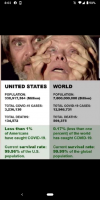Missing the point. Death rates should be ignored if the virus is as contagious as it is. 135k dead is 135k dead and the percentages are irrelevant. More in 4 months than the deaths in Vietnam and Korea combined and they both combined lasted maybe 15 years? Think of the impact those wars had on our history which still lasts today for those who served and are sti alive today. This is at least a top 3 US crisis since 1900.
Already been over this first point, but must repeat: 3million died in Vietnam. 5million in Korean War. Covid doesn't even come close to either.
But more than that, your logic is flawed. By your logic, the really big killers, like heart disease (~18million last year, worldwide) and cancer (~9.5million) should be The Top 2 US (and Global) Crises
every year since 1900. Or 1800. Or 1700.
But they're not. Instead, they are family crises. Crises at the community level. A loved one dies to one of these killers, and it's a crisis for the family and friends. They hold a funeral, maybe a visitation or wake, they bury or cremate, they mourn and remember, and then they figure out how to move on with the pain of the loss.
It happens over and over again, in towns and cities and rural areas around the world.
But they're not National Crises or International Crises.
Why not?
Because we have to live with them. Same as deadly automobile accidents. We mitigate and reduce the risks as best we can while recognizing that there's no way to eliminate the danger. We continue to look for cures, better safety features, ways to reduce risk. Meanwhile, we get on with life.
The world hasn't yet had the lightbulb come on for covid-19 (though it seems perhaps Sweden did). A lot of folks haven't yet realized that this new disease is, like heart disease or the flu or German measles or the common cold, with us from now on. The genie doesn't go back into the bottle.
We will eventually, collectively, learn to live with this new disease, get better at mitigating its risks (hopefully including a vaccine), and figure out how to get on with our lives in spite of it. We will send our kids to school in spite of it. We will play football in spite of it. We will go out for a drink with friends in spite of it.
Not because we want to live with it. But because we don't have a choice.
It seems a whole lot of us, led by a hysterical media, haven't yet figured this simple truth out.
And you're one of them. Brother, this isn't a war: we don't have the ability to turn it off and go home. Best idea is to stop thinking of it that way.





